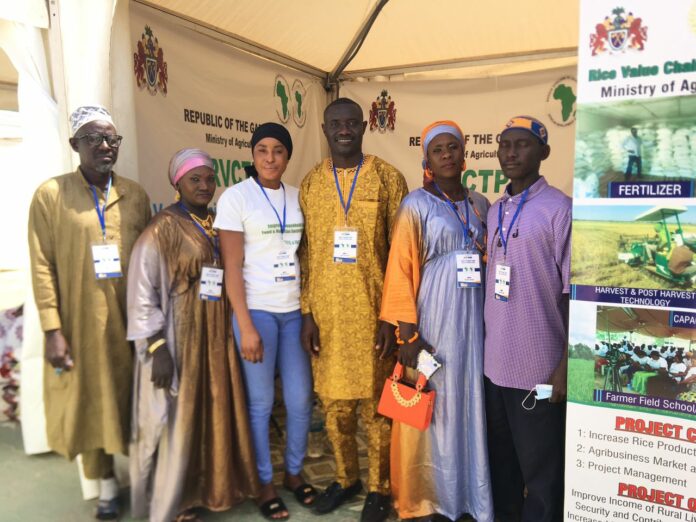By: Dawda Baldeh
Farmers group in Central River Region (CRR) North, who benefited from the Rice Value Chain Project (RVCP), have vowed to end the high dependency on imported rice in the country as they began selling locally cultivated and packaged rice which is free from chemicals.
The farmers group have now started to enjoy the fruits of their labour compared to the traditional rice farming that focuses mostly on cultivating rice for family consumption.
Kawsu Fofana, a rice farmer at Kuntaur village who lead CRR north rice farmers group currently marketing their rice at the Trade Fair expressed gratitude to the project for showing them a way to make farming a lucrative business.
“Before, we only cultivate rice for consumption, but the RVCP has taught us how to make more income from it,” he said, adding that they were given 21 days of training to help them understand how to use different varieties of rice.
In the beginning, 25 people representing different villages were trained and provided with seeds and fertilizer to start rice farming. The farmers said they are determined to reduce the dependency on imported rice in the country in a few years.
“We come here to sell the rice that we cultivated. The price is low compared to the imported rice, and we want people to patronize us,” Mr Fofana added.
The rice cultivated is distributed to the local market to attract buyers. Mr Fofana said they are challenged with accessing a large market. “We only have weekly ‘lumos’ (market day) which is not big.
“Now we have Marou Farm and Zakaria business operators who are coming on board to buy our rice. We are selling our rice at D1,700,” Mr Fofana explained.
However, he added that they don’t have the much-needed equipment to level the rice fields so that the flow of water can be controlled.
“We want to produce more rice for the country to help reduce the price of rice, but we are challenged because in the rains water will destroy our rice,” the rice farmer noted.
The trip of the team selling their rice at the Trade Fare was facilitated by Rice Value Chain Project (RVCP) to help them access markets.
They are using three different varieties which can be harvested every three months. These are varieties that can help farmers generate income in a short period.
“We are grateful to the project officials for helping access the market and now we are able to sell rice,” he returned in gratitude. “If other projects can emulate RVCP, rice importation will reduce in the country.”
The farmers in CRR North are represented at the Trade Fair by Kawsu Fofana from Wassau, Mariama Ceesay of Naini Sukuta, Serreng Tunkara of Jarumbeh Koto, Nyima Barrow of Tubakoto and Modou Musa Ceesay of Barjali village.
Meanwhile, Gilbert Jassey, Regional Coordinator Farmers business school CRR north representing Rice Value Chain, said they focus on rice production with funding from the African Development Bank to the tune of $7.7m.
According to him, the project’s main intervention areas are URR and CRR north and south where they work directly with the regional directorate of agriculture and farmers.
“We support farmers with training and inputs like seeds and fertilizer to make farming easy for them. We have been supporting them for the past three years to push their production by making rice available for every Gambian.
“We help them to market their rice. The price of rice is escalating daily, and we are encouraging people to buy the locally produce rice which is free from chemicals compared to the imported rice,” he said.
He added that the rice produced by the farmers is pure and fresh which is good for consumption, saying it is directly from the farm to the market.
“We want rice to be affordable to everyone in the country. The imported rice is fumigated to the extent that even the insects are afraid to eat the rice and it has sight effects. The rice produced here is free from chemicals and is healthy,” Mr Jassey said.




